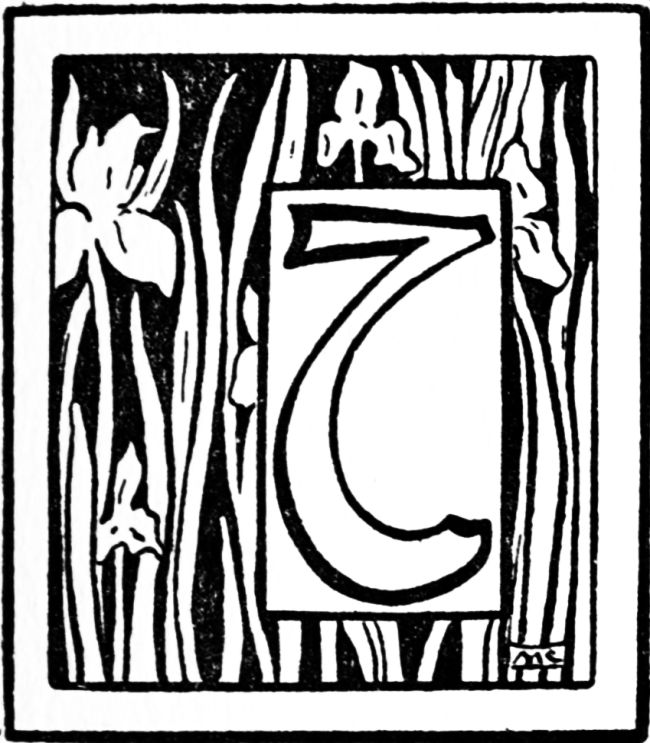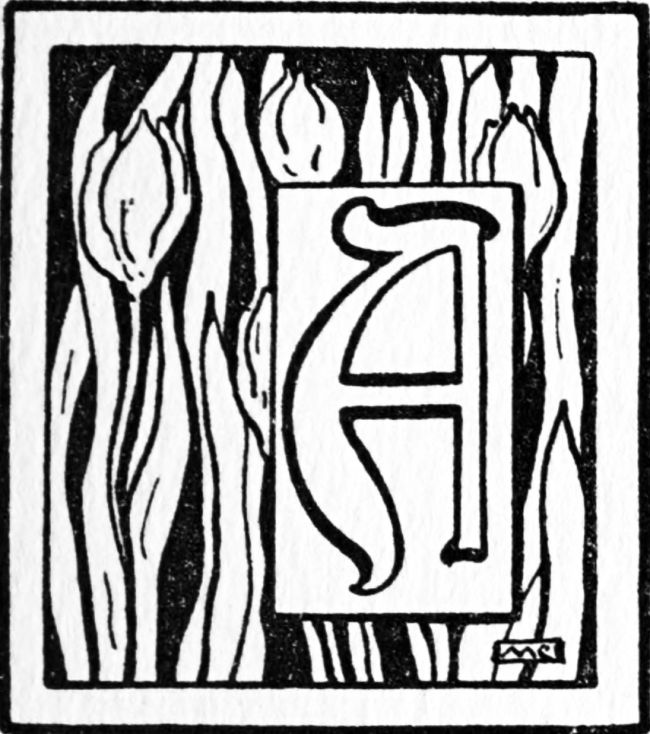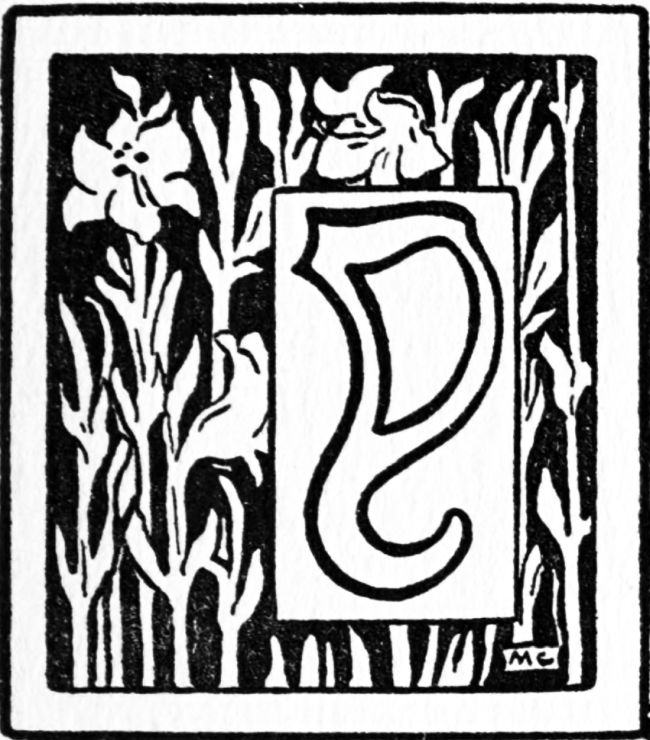

This edition consists of but 357 copies.
This book is Number

The Child & the Dream

THE CHILD
A CHRISTMAS
STORY
BY
MCMVIII
PORTLAND, OREGON
TO MY SEVEREST CRITIC,
AGED SEVEN
COPYRIGHT 1908
BY MARION COOK

This, little Dear-My-Love, is the story of a Child whom I am sure you would have loved. For people did love her very much, she was so quaint and dear.
She was a remarkably bright Child and the beauty of her being bright was that she did not know it. She did bright things and said bright things and it never entered her mind to marvel at her own cleverness. However, I doubt if she would have thought of what I am going to tell you, had it not been for the Storyist.
It was somewhat absurd, the whole thing; yet it was an experience one would not soon forget.
It began, little Dear-My-Love, on a certain morning when the Child stood looking out of the window of her own pretty room. She was watching two little birds which sat huddled close together on the branch of a big fir tree; but she really wasn’t thinking about the birds. She had heard Lady-Mother say at breakfast that it lacked but two weeks of Christmas, and she had not yet selected her Gift for Lady-Mother. She was so extremely particular about what it should be that it was difficult to decide upon anything.
Presently the Child had an idea; and the more she thought of it, the more splendid it seemed as a surprise for Lady-Mother. You see, little Dear-My-Love, she wasn’t old enough to be very wise and so sometimes she did rather queer things.
A few moments later she knocked at the door of the Storyist.
She found her writing, as usual, but the Storyist was patient about interruptions and this time she set the Child lovingly upon her knee and asked what she could do for her.
“I’d like some story-paper,” said the Child.
“You may have all you wish,” proffered the Storyist, handing her a pad of scratch-paper.
The Child fingered it critically. “Will it do?” she asked.
The Storyist smiled. “I think it will—for you,” she said.
“But you see I want it very nice,” explained the Child, “because it’s for a Christmas story I’m going to write. That is, the story isn’t about Christmas, but it’s for a Christmas present.”
The Storyist appeared interested. “So?” she said. “Who is it for? But I think I can guess,” she added quickly.
“Well, if you know please don’t tell,” cautioned the Child. Then she asked, “May I see what you’re writing?”
“Certainly,” assented the Storyist, and showed her a typewritten sheet.
The Child read:
“‘Her voice was that smooth and slippery-like that you found yourself swallowing what she said without realizing till afterward that the words stuck in your throat.’”
She read it a second time, but was sure she didn’t quite understand.
“Is it hard?” she inquired.
The Storyist looked thoughtful. “Not very,” she replied. “You just have to know what you want to say and then say it the best you can.”
It sounded reasonable and the Child grew encouraged.
“She’d be surprised to see it in a paper, wouldn’t she?” she laughed.
The Storyist agreed that she would.
When she went out she held tightly several sheets of typewriter paper and a newly-sharpened soft pencil. She was eager to begin. She set herself down at the tiny desk Lady-Mother had given her and everything was still for a long time.
Of course she was very little to think of trying to write a story, but O, little Dear-My-Love, she knew perfectly well just what she wanted to say!
And so she worked very hard indeed and wrote as fast as she could make her letters.

And that night, little Dear-My-Love, an odd thing happened. It was some time after Lady-Mother had kissed her and, turning out the light, had gone softly away, that the Child heard a voice say, right in her ear:
“It’s very queer.”
She started up in bed. “What’s queer?” she said. But no one answered her. She sank back again upon the pillow and wondered if she had been dreaming. If she had—
“What did you say was queer?”
It was some one else speaking this time, and the Child raised herself on her elbow and listened intently.
Then the first voice said, “Why, about the train, you know. She might have known it would be troublesome. Of course, if it weren’t so long I could manage it better, but as it is—” and the voice trailed off into a sigh.
The Child waited to hear no more. “What makes you ‘sigh like a furnace’?” she said. She had heard the Storyist quote Shakespeare with good effect.
The voice answered her; its tones were very sweet. “O, I didn’t know you were awake!” it said. “Is this where you always sleep?”
“Yes,” answered the Child. “Do you like it?”
“It’s very pretty,” said the voice. “It must be a relief to have a room small enough for convenience. Why, even this foot-board—”
“O, is that where you are?” asked the Child. “I’ve been looking all over but I couldn’t see you. Why, you’re Lady Arabella!” she cried, as she caught sight of a small figure, elaborately dressed, balancing itself on one end of the foot-board. “How did you get here?”
“Well, I simply had to come,” said Lady Arabella. “I had to get where it was warmer. Did I hear you say something about a furnace?”
The Child looked at her in surprise. “Yes; were you cold?” she asked.
“I should say,” replied Arabella. “Those marble halls are just dreadfully cold; they’re positively frigid. Sometimes we dance as you told us to, and that warms us up. But I was too tired to-night to dance.”
If Arabella could have seen the Child’s face she would have noticed how sorry and disturbed it looked. But it was too dark in the room for her to see distinctly.
“I’m sure I never thought of that,” said the Child, and her tone was penitent. “You see, I thought you would like the marble halls. But I never had any ’sperience with them myself. Why don’t you put on extra wraps when you feel so cold?”
“Extra wraps!” repeated Arabella. “I haven’t any. The only kinds of clothes I have are dinner gowns and ball gowns. They’re not very warm, you know. I often tie handkerchiefs around my throat when that gets cold, but they are only ‘dreams of lace’ and don’t do much good. Don’t you think you could get me a wrap or two?”
“Yes indeed, I can,” answered the Child. “I’ll see about it to-morrow.”
“And a matinee for mornings,” Arabella suggested. “Something that won’t soil, especially as I have to spend all my mornings in the conservatory.”
“What makes you stay there?” asked the Child. “Why not go somewhere else?” She was by this time sitting up in bed, her hands clasped about one knee, intensely interested.
“I have to,” answered Arabella, with another sigh. “I have to do what you tell me to.”
“It’s too bad,” declared the Child; “I’ll change that to-morrow, too.” Then she suddenly remembered her manners. “Won’t you sit down?” she asked.
“How can I up here?” Arabella replied. “My train is in the way. If you could help me down I should like it.”
So the Child reached out her two hands and, lowering Arabella to the bed, placed her carefully upon the counterpane.
“Aren’t you going to bring Sir Marmaduke, too?” asked her visitor in dismay.
“Is he up there? I didn’t see him,” said the Child.
“He and I were talking when you first woke up,” answered Arabella. “Don’t you remember? Certainly he is here. He has to be always at my side, you know. At least, that’s what you said.”
“So I did,” acknowledged the Child. Then she began to laugh. “O, dear!” she gasped, “I didn’t think how it would be, you see—his always being with you! O, I didn’t really mean that! It’s too funny!” and the bed shook so that Sir Marmaduke almost fell off the foot-board.
The next moment she turned to Arabella. “You don’t object to it, do you?” she asked seriously.
“Well,” Arabella admitted, whispering very softly so that Sir Marmaduke might not hear and the Child had to bend low to catch the words, “to tell the truth, it does get pretty tiresome. Yes, I rather wish he wasn’t with me all the time. If you could fix it so that we could be together just on special occasions, you know—”
“I see,” said the Child quickly; “I’ll fix it to-morrow to suit you. I have plenty of paper left.”
Then she turned to Sir Marmaduke and[15] helped him to a seat quite a little away from Arabella. She thought that relief for the much afflicted heroine could not come too soon.
“You don’t talk much, do you?” she observed to Sir Marmaduke. “I didn’t know you were such a quiet man.”
“Well,” he answered, twirling his moustache and settling his cravat after his change of position, “it’s a case of necessity. You said I did nothing but listen to the music of her voice. To be sure, I don’t mind,” gallantly turning to Arabella, “but I think she’d like to have me talk more.”
Arabella blushed prettily. “Yes, it would be more interesting for me,” she agreed.
It was the Child that sighed this time. “If you’d rather, I’ll change it so you can talk more. And I’ll make your train shorter, too,” she said to Arabella. “Five yards is altogether too much.” She began to wonder if she could remember all the alterations that had to be made. There seemed to be so many things she hadn’t thought of.
An odd sound coming from Arabella’s side of the bed arrested her attention. She appeared to be in some trouble.
“What is the matter?” asked the Child.
“O, I do wish I could yawn!”
“Why don’t you?”
“I can’t,” replied Arabella. “My fan isn’t here. I forgot to bring it.”
“Do you have to have that before you can yawn?”
“You said so,” was the answer. “You said I gave nothing but gentle yawns behind my fan.”
“O, I’d forgotten,” said the Child. “But what makes you want to yawn?”
“Because I’m sleepy, you little goosey,” returned Arabella impatiently. “I guess you’d be sleepy, too, if you could never have a wink of sleep from one week’s end to the other!”
“I guess I would,” the Child confessed. “But why can’t you sleep when you want to?”
Arabella eyed the Child with astonishment. “I should think you’d know,” she said. “You don’t seem to remember that my hair is spun gold, and how could I ever get it combed again if I should lie down and get it all tangled? It would be so much nicer if it were just hair. Don’t you think you could—”
“O, yes, of course I can,” the Child answered. It began to look discouraging.
“And just look at my eyes,” went on Arabella. “Do you see anything queer about them?”
The Child looked. “They’re very bright.”
“Yes,” pursued the other, “that’s because[17] they’re stars, you see. But I could see much better out of them if they were just regular eyes, I think. Don’t you?”
“Of course you could,” said the Child. “Anybody could.”
“I’m glad you think so. It will be a relief to have eyes like other people. If my eyes were once fixed I shouldn’t care so much about my ears.”
“Your ears? What is the matter with them?” demanded the Child.
“You’re queer not to remember,” returned Arabella. “They’re only pink shells and they roar so I can’t hear well half the time. There are other things, too; my mouth, for instance. You made that a lovely ripe red cherry, which is, to say the least, inconvenient and even tempting!”
The Child sighed again. “I wanted to make you beautiful,” she explained apologetically.
“Yes, I know,” Arabella replied; “but I think I’d rather be good than beautiful. It means more.”
“But you are good, aren’t you?” asked the Child.
“I don’t know,” doubtfully answered Arabella, “you didn’t pay much attention to that. I guess I’m too uncomfortable to be good. I suppose you think that I am not real and it doesn’t matter, but you see I am real—to you.[18] You had to think me out. And so I can only be what you are—that is, what you love and think and want. Do you understand?”
“I see,” the Child reflected.
“And it’s the real that counts,” continued Arabella. “You can’t always judge from the outside—either of people or things.”
“No,” put in the Child eagerly, “I know that. It’s that way with my sums. Sometimes I will do my figures so carefully and the example will look lovely when, after all, it’s full of mistakes.”
“And there’s another thing,” replied Arabella, “your pride, I mean. As a matter of fact, you’re writing this story for yourself and not for Lady-Mother. And, candidly,” she added, “it’s nothing to be proud of. We’re not much of a success!”
It was blunt but the Child knew that it was true. She was silent for a time, then she said, “It would be a good deal of trouble to make you all over again and, anyway, I guess I don’t know enough—yet. You won’t mind if I don’t?” she inquired anxiously.
“Not a bit,” Arabella assured her.
The Child was getting sleepy and Arabella saw it. “Come,” she said to Sir Marmaduke. “We’re staying too long.” He rose obediently.
“O, must you go?” asked the Child politely. “Do come again and—that is—of course maybe[19] you couldn’t—but still—” her voice grew fainter and fainter. Arabella and Sir Marmaduke faded away and presently—
It was the Storyist bending over her. “Good morning,” she said. “It’s time to get up.”
The Child rubbed her eyes.
And you know, little Dear-My-Love, that she had been asleep all the while!

You remember, little Dear-My-Love, how it feels just before Christmas. Well, it was that kind of a morning. Nearly everyone carried mysterious bundles, and Christmas sights and sounds were everywhere.
The Child was very happy. She and the Storyist were on their way to buy the Gift. She felt that she needed advice. She had been surprisingly meek and quiet the last few days.
“What made you give up your plan?” asked the Storyist. “Didn’t it suit you?”
“No,” said the Child. “Besides, the people in it weren’t happy.”
“How do you know?” the Storyist returned. And then the Child related the Dream.
It was all very interesting and the Storyist listened attentively.
“So you see,” concluded the Child, “it wouldn’t do.”
The Storyist thought. “What do you think a Gift ought to be like?” she asked.
“It ought to be something beautiful all through, and something good and real and that would make people glad,” the Child answered. She had thought it out quite carefully.
The Storyist promised to do the best she could.
They spent a good deal of time looking in the shops and at last made their purchase. Now it doesn’t matter, little Dear-My-Love, just what it was; only it was something that Lady-Mother needed and it was nice and the Child was satisfied with it.
“But there’s only one Gift,” remarked the Storyist on their way home, “that is really everything that you say a Gift ought to be.”
“What is that?” asked the Child.
The Storyist looked down at her very tenderly.
“Love,” she said.
And after that, little Dear-My-Love, people often wondered that she was such a thoughtful Child and tried so hard to make everybody comfortable. But you know why.

Here endeth the Story of The Child and The Dream, by Marion Cook, as done by The Metropolitan Press
Transcriber’s Note:
Punctuation and spelling inaccuracies were silently corrected.